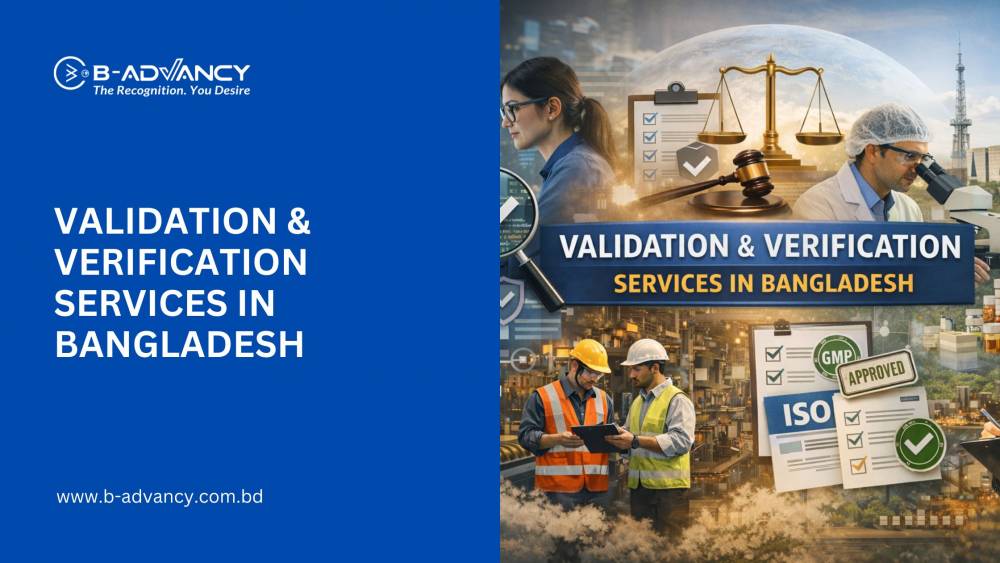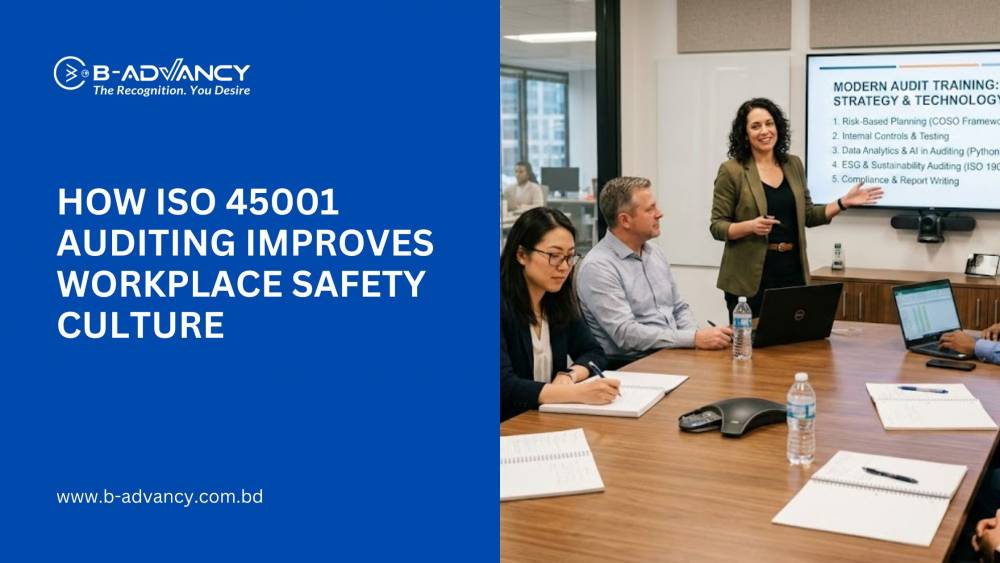Bangladesh, with its extensive coastline and a rich history in shipbuilding, plays a significant role in the global maritime industry. As the industry evolves, maintaining high standards of quality, safety, and environmental responsibility is crucial for both domestic and international competitiveness. ISO certification provides a globally recognized benchmark that helps shipbuilding and marine companies in Bangladesh meet these standards. In this blog, we will explore the importance of ISO certification for the shipbuilding and marine industry, the specific ISO standards that apply, the benefits they offer, and how you can start your certification journey with B-ADVANCY Certification Limited. Additionally, we will provide references to relevant authorities in Bangladesh to help guide your certification process.
What is ISO Certification and Why is it Important for the Shipbuilding and Marine Industry?
ISO certification is a mark of quality from the International Organization for Standardization (ISO), demonstrating that a company adheres to internationally recognized management system standards. For the shipbuilding and marine industry, ISO certification is critical for ensuring that products and services meet consistent quality, safety, and environmental standards.
In Bangladesh, the shipbuilding industry has seen rapid growth, producing a wide range of vessels, from small boats to large ocean-going ships. ISO certification helps these companies maintain high standards, reduce risks, and improve efficiency, which are essential for competing in the global market. Moreover, compliance with ISO standards can facilitate entry into international markets, where adherence to such standards is often a prerequisite.
Key ISO Standards for the Shipbuilding and Marine Industry
Several ISO standards are particularly relevant for the shipbuilding and marine industry in Bangladesh:
ISO 9001:2015 - Quality Management Systems
ISO 9001:2015 provides a framework for ensuring that products consistently meet customer and regulatory requirements. For the shipbuilding industry, this means implementing a quality management system that enhances product reliability, reduces defects, and improves customer satisfaction.
ISO 14001:2015 - Environmental Management Systems
Given the environmental impact of shipbuilding activities, ISO 14001:2015 is vital for managing environmental responsibilities. This standard helps companies minimize their environmental footprint through efficient resource use, waste reduction, and pollution control.
ISO 45001:2018 - Occupational Health and Safety Management Systems
ISO 45001:2018 is essential for managing health and safety risks in the shipbuilding industry, where workers are exposed to significant physical hazards. This standard helps companies create a safer workplace by systematically identifying and mitigating risks.
ISO 50001:2018 - Energy Management Systems
Energy consumption is a major concern in shipbuilding, where energy-intensive processes are common. ISO 50001:2018 helps companies optimize energy use, leading to cost savings and a reduced environmental impact.
ISO 30000:2009 - Ship Recycling Management Systems
This standard specifically addresses the safe and environmentally sound recycling of ships. It is particularly relevant for Bangladesh, which is a global leader in shipbreaking. ISO 30000:2009 helps companies manage the risks associated with ship recycling, ensuring compliance with international regulations and protecting both workers and the environment.
Benefits of ISO Certification for the Shipbuilding and Marine Industry in Bangladesh
Enhanced Product Quality and Safety
ISO certification ensures that shipbuilding processes are optimized for quality and safety, leading to better products, fewer defects, and a stronger reputation in the market.
Operational Efficiency and Cost Reduction
By implementing ISO standards, shipbuilding companies can streamline their operations, reduce waste, and improve resource efficiency. This leads to cost savings and higher productivity.
Compliance with Environmental and Safety Regulations
ISO certification provides a structured approach to meeting environmental and safety regulations, which are critical in the shipbuilding and marine industry. This helps avoid legal issues and enhances sustainability.
Increased Market Competitiveness
ISO certification is recognized globally, giving certified companies a competitive edge. It can help attract new clients, partners, and investors, both locally and internationally.
Facilitation of International Trade
ISO certification aligns shipbuilding companies with global standards, making it easier to enter and compete in international markets. This is particularly important for Bangladeshi companies looking to expand their export potential.
Steps to Achieve ISO Certification for Your Shipbuilding and Marine Business
Achieving ISO certification involves several key steps:
Initial Assessment and Gap Analysis
Begin by assessing your current processes against the requirements of the relevant ISO standard. Identify gaps and areas needing improvement to meet the certification criteria.
Develop and Implement a Management System
Design and implement a management system that complies with the chosen ISO standard. This may involve documenting processes, setting objectives, and training employees.
Internal Audit and Management Review
Conduct internal audits to ensure your management system is effective and compliant. Regular management reviews are essential to address any issues and drive continuous improvement.
Select a Certification Body
Choose a reputable certification body, such as B-ADVANCY Certification Limited, to conduct an external audit. Prepare thoroughly for this audit to demonstrate compliance with the ISO standard.
Achieve Certification and Commit to Ongoing Improvement
After a successful audit, you will receive ISO certification. It’s important to maintain and improve your management system to retain certification and continue benefiting from it.
Challenges in Implementing ISO Standards
While ISO certification offers numerous advantages, implementing these standards can pose challenges, including:
Resistance to Change
Employees may resist changes to established processes, especially in an industry like shipbuilding where traditional methods may be deeply ingrained. Effective communication and training are essential to help staff understand the benefits of ISO certification.
Cost and Resource Allocation
The costs associated with certification, including consulting, training, and auditing, can be significant. However, the long-term benefits, such as improved efficiency and marketability, often justify these initial expenses.
Documentation and Process Management
Maintaining comprehensive documentation can be time-consuming but is essential for successful certification. A well-organized documentation system is key to demonstrating compliance during audits.
B-ADVANCY Certification Limited can guide you through these challenges with expert support, making the certification process more manageable and efficient. To contact them: Email: bangladesh@b-advancy.com | Call: +8801612264559
References and Links to Related Authorities in Bangladesh
For more information on regulations and guidelines relevant to the shipbuilding and marine industry in Bangladesh, you can consult the following authorities:
-
Department of Shipping, Bangladesh: The principal government body regulating the maritime sector in Bangladesh. Department of Shipping Website
-
Bangladesh Marine Academy: Provides training and certification for maritime professionals. Bangladesh Marine Academy Website
-
Bangladesh Inland Water Transport Authority (BIWTA): Oversees inland water transport, including the development and regulation of shipbuilding standards. BIWTA Website
Conclusion
ISO certification is more than just a credential for the shipbuilding and marine industry in Bangladesh; it is a strategic investment that can significantly enhance product quality, operational efficiency, and market competitiveness. By aligning your processes with internationally recognized standards, your business can achieve consistent product safety, improve customer satisfaction, and gain a competitive edge in both local and global markets. While the certification journey may present some challenges, the long-term benefits far outweigh the initial efforts.





































































































































































































